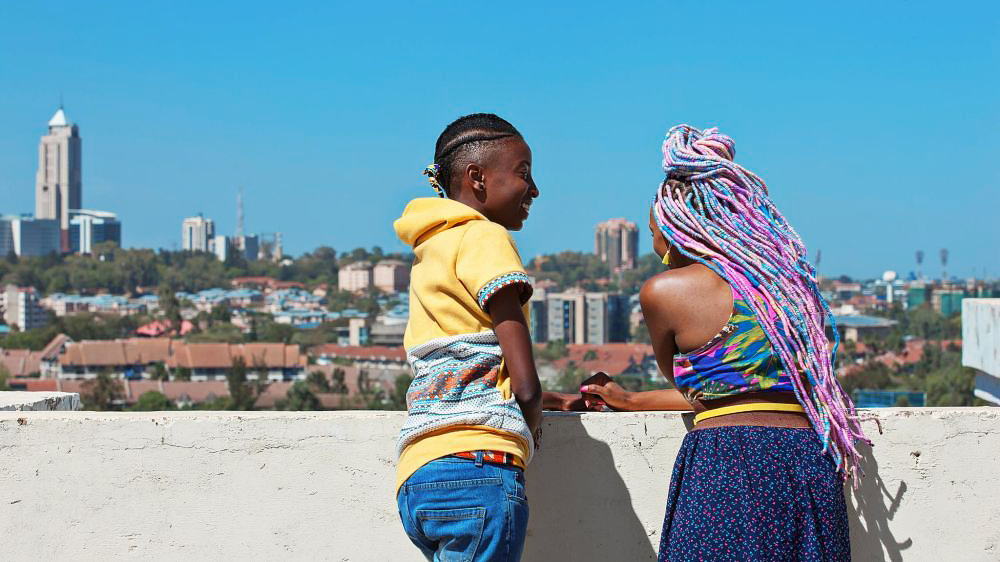I really wanted to embrace this story of two outcasts in Nairobi. Judging by the hype and controversy around it – banned, screened for a week, banned again, ultimately not chosen as Kenya’s Oscar contender – it seemed like the advent of an African Blue Is The Warmest Colour. A story brimming with color and life, a story to break down taboos and make bold statements about love, equality and freedom of expression.
Director Wanuri Kahiu, a pioneer of Afro-Bubblegum, a joyful heir to Afrofuturism, zooms in on a vibrant Nairobi in Rafiki (Swahili for “boy/girlfriend”). Pink houses and food stands mark the world of Kena (Samantha Mugatsia) and her pal Blacksta (Neville Misati), inseparable by virtue of motorized wheels and football courts; navigating this world of limited means, a world, which is by far not poor or defective, just stuck in its good-hearted ways. Over here is the face of Kena’s dad, local politician John Mwaura, “the people’s candidate”, tellingly peeking from behind the grid of his shop, a kind but disappointing father figure. John is the Montague to Peter Okemi’s dynasty of Capulets in preparation for a local election that only serves to bring Kena closer to Okemi’s daughter Ziki (Sheila Munyiva), a great dancer with multicolored dreads, occasionally vandalizing John’s posters.
From rivals to friends, Kena and Ziki sense something else in each other’s looks. Unwilling to follow the path mapped out for them by a patriarchal and traditional society, both feel another possibility, a parallel reality under the watchful eyes of gossiping food stand owner Mama Atim, in the longest tease of a first kiss in movie history.
Rafiki is at its best in these moments beyond language. There is undeniable chemistry between Mugatsia and Munyiva and it’s convincing enough to leap from the screen. Yet, in a world of grays that conviction is undermined with every meaningless interaction about school grades or corny date prospects (“We will definitely stare at the stars”). After the connection is established, the film does not know what to do with it. First time actress Mugatsia does a very solid job with little to chew on, yet Munyiva on the other hand appears to choke on the lines she is force-fed.
Some focused direction could have done the movie good. The way things stand, it remains unclear what Kahiu’s point is, precisely. Her movie is like a Big Mac prepped for a photo shoot: superficially stunning, but without nutritional value, glued together from parts that fall apart upon closer inspection.
It is not sexually graphic. But it’s not very political either, neither reinforcing nor openly criticizing the church and the values of Kenyan society. Passing up on opportunities for real conflict – What about Ziki’s friend and her jealousy? What about gay solidarity? – Rafiki’s flashes of emotional intensity and violence appear unmotivated and are about as visceral as a news blurb of a car accident on another continent. Does Kahiu even really believe in their relationship? We never get to see what really drives Kena, and Ziki stays even more remote. Neither of them owns their romance and their power relation seems to change arbitrarily. One moment Kena is lecturing Ziki how their forbidden love will be the real thing, next thing you know she feels threatened and observed when Ziki is playfully teasing her in public. What is “real” in this universe of formulaic LGBTQIA+ speech and formulaic neighborhood revolt?
That’s not to say that I don’t admire Kahiu’s guts. I wished she had more vision to go along with them. As such, Rafiki sadly is not steamy enough to work on a gut level, not painful enough to work on a moral level and not poetic enough to work on an aesthetic level. It outstays it welcome, turning a pivotal character like Mama Atim into a caricature in the final foreseeable moments of its runtime. Best to follow Blacksta’s advice and hop on the back of his bike to do another spin, until next time, until things gain more shape, until we say what we mean and things are as real as they come.




I’m glad we’re seeing more LGBT movies!